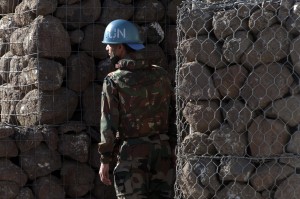UN requests more time as Austria readies Golan pullout

A UN soldier stands next to a shelter inside a UN base near the Quneitra crossing between the Israeli-controlled Golan Heights and Syria on June 7, 2013. Austrian troops in the UN monitoring force on the Golan Heights will begin pulling out on Wednesday, June 12, 2013, the defense ministry said, as the UN appealed for more time to find a replacement for the departing soldiers. AP PHOTO/SEBASTIAN SCHEINER
VIENNA—Austrian troops in the UN monitoring force on the Golan Heights will begin pulling out on Wednesday, the defense ministry said, as the UN appealed for more time to find a replacement for the departing soldiers.
“Between 60 and 80 troops will return to Austria tomorrow afternoon,” defense ministry spokesman Andreas Strobl told AFP Tuesday.
“This will be the first of several groups… we will gradually bring the soldiers back to Austria,” he added.
The alpine state, which has been a cornerstone of the UN force monitoring a ceasefire between Syria and Israel since 1974, announced just days ago on Thursday that it would withdraw its peacekeepers because of deteriorating security on the strategic plateau.
Defense Minister Gerald Klug said the pullout of Austria’s soldiers on the Golan Heights would take between two and four weeks.
Some 380 troops are currently stationed there, according to the ministry.
A top Israeli government official told AFP Tuesday that several dozen Austrian troops had already left the mission’s headquarters. Israeli public radio said they were administrative staff.
“But the majority of soldiers will remain in place until the UN has found a country that can send troops to replace the Austrian ones,” said the Israeli official, who asked not to be named.
Foreign Minister Michael Spindelegger said earlier that he wanted the withdrawal to happen “as quickly as possible.”
But UN peacekeeping chief Herve Ladsous appealed to Vienna for more time in an interview with the daily Die Presse to be published Wednesday.
“Austria must make us a better offer. Because to be honest: we need more time,” he said.
“We are now working together to find an appropriate solution,” he added, noting that Austria had been the “backbone” of the UN Disengagement Observer Force (UNDOF) for the past 39 years.
“We can hardly find replacement contingents in less than six to eight weeks. We are trying our best and are discussing this problem with troop providing countries,” he added.
Ladsous, whose comments were published in German, said he had received an offer from “a country in the Pacific” to send troops to replace some of the departing Austrians. He refused to elaborate, however, saying only that he would announce which country it was later in the week.
Spindelegger earlier defended Austria’s withdrawal in the face of criticism by Israel and some Austrian opposition parties.
“We took this decision in the government and we are going to implement it,” he said after a national security council meeting late Monday.
Philippine, Indian peacekeepers
The Austrian pullout will leave the UNDOF, headquartered in Quneitra, with just 341 troops from the Philippines and 193 from India.
Japan and Croatia have also withdrawn in recent months as battles between Syrian government and opposition forces spread into the ceasefire zone.
President Vladimir Putin said last week that Russian troops could replace the Austrians but under the terms of the 1974 accord that created the force, members of the UN Security Council are not allowed to take part.
The US ambassador to Vienna voiced regret Tuesday over the Austrian decision and called for it to be reviewed.
“Austria should have called for a wider discussion at the UN about improving the weapons and equipment for the troops,” he was quoted as saying in Die Presse.